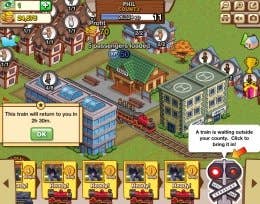All Aboard - Part Two
Frederic Descamps and Jordan Maynard on Facebook - and the future of A Bit Lucky
Yes - we've seen a lot of people that will add a train and select the optional wall post. And they'll add their own incentives - maybe that if ten people join their train, they'll upgrade it to a Shuriken, for example.
For some people it's a no-brainer. Free-to-play has been a huge phenomenon in the last ten years, invented by Nexon in Korea, but it's now really moved over to the US and Europe. For a long time I think it was confined to traditional games, like MMOs - but on Facebook it's like the perfect storm, because you have this very broad user acquisition opportunity. You have potentially 275 million users to attract to your game; but even if only a small percentage end up paying you can still make quite a bit of money.
I think there are two angles to attracting users. One is the fact that people will invite their friends, which is good. But at some point, they or their friends will spend money - and one thing we wanted to do was prove that a higher quality game on Facebook was valuable, and that the metrics would look better.
We have some very interesting metrics regarding monetisation for our active users is pretty high - it's above average for games on Facebook - so it's fascinating. Our graphic artists are having a great time, because between the time they think of a new item to put out and the time it's released, that could just be a few hours.
But they can also look at how people react to that content, and make changes - maybe make more items from a specific series, for example.
The Gold Moskva Jet is the best train in the game, and it's been a very good money-maker for us - because it's only available with Lucky Bucks. To be honest, the number of bits that we had to make for it, because we already had the silver one... it was incredible from a business perspective, and probably took a half hour to create.

It's a huge issue for Facebook - people give them some flak for changing stuff, and making some games less viral for some channels. But quite frankly, we completely understand that, because they have a huge population, with roughly two types of people. One that really likes games and wants to play them with their friends, with achievements and so on; and the other that couldn't care less.
They have to, for the sake of their own survival, to make some drastic changes - and in some ways we can applaud these changes, because they were hefty. But they also confirmed the other thing that we wanted to do regarding games on Facebook, which is that it shouldn't be about who spams the most, or who finds the dirtiest tricks to get people in their game.
We think it should really be, first and foremost about the games - the quality of the entertainment - and the engagement. When Facebook made its latest set of changes a few weeks ago, that was the very first time they mentioned engagement as one of the most important metrics for them - because it's an indication of the fun people are having.
I think Facebook still has some work to do in terms of the process of discovery for applications, but overall they've made the right decisions over the last weeks and months.
People really should give them more credit - no pun intended - because they really do care about their platform, their ecosystem. If you notice in the announcement about a month ago, they're very thoughtful about the changes they make - they've been through them, of course they do lots of data testing, but they're really thoughtful.
And it's also an internet company - they've proven that if they do something that doesn't work so well, they're willing to go back and change it. In the end it's great, because our interests are completely aligned - we want to make great games, and they want to have great games on Facebook. The better and higher quality the games on Facebook, the more they're going to make, because we're giving them a 30 per cent cut on the Facebook credits, so the more engaging the games, the more gamers spend money.
And that, by the way, is absolutely fine with me - I get asked a lot about the 30 per cent, and if that's too high. Well, no, it's not too high. Of course Facebook has to earn it, but I want Facebook to make money - I give them 30 per cent without thinking about it. It's the single largest gaming platform ever created in the history of mankind.








